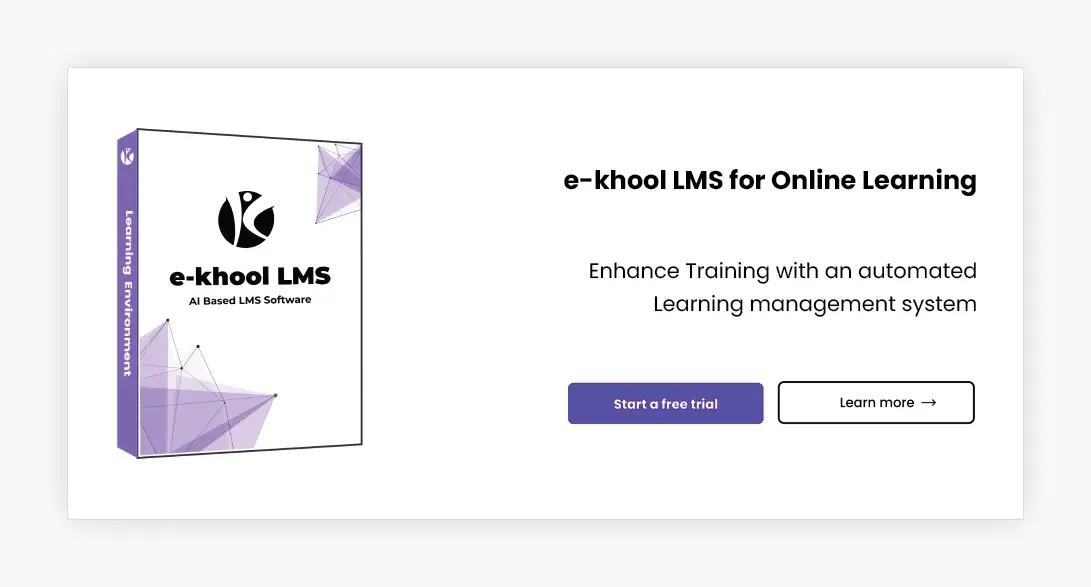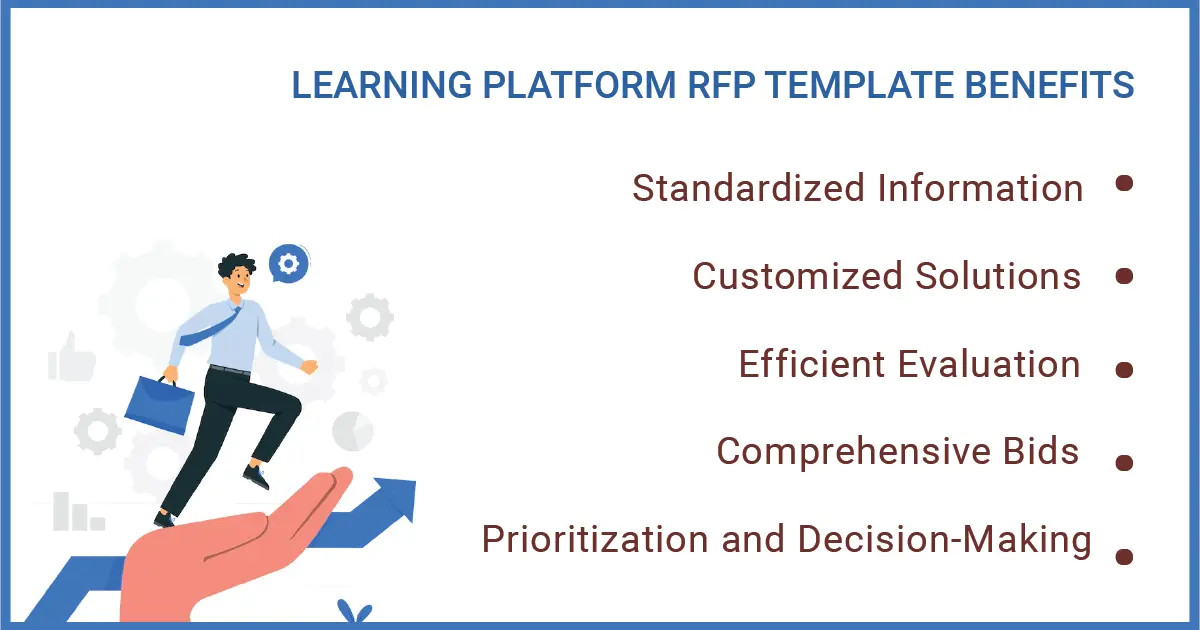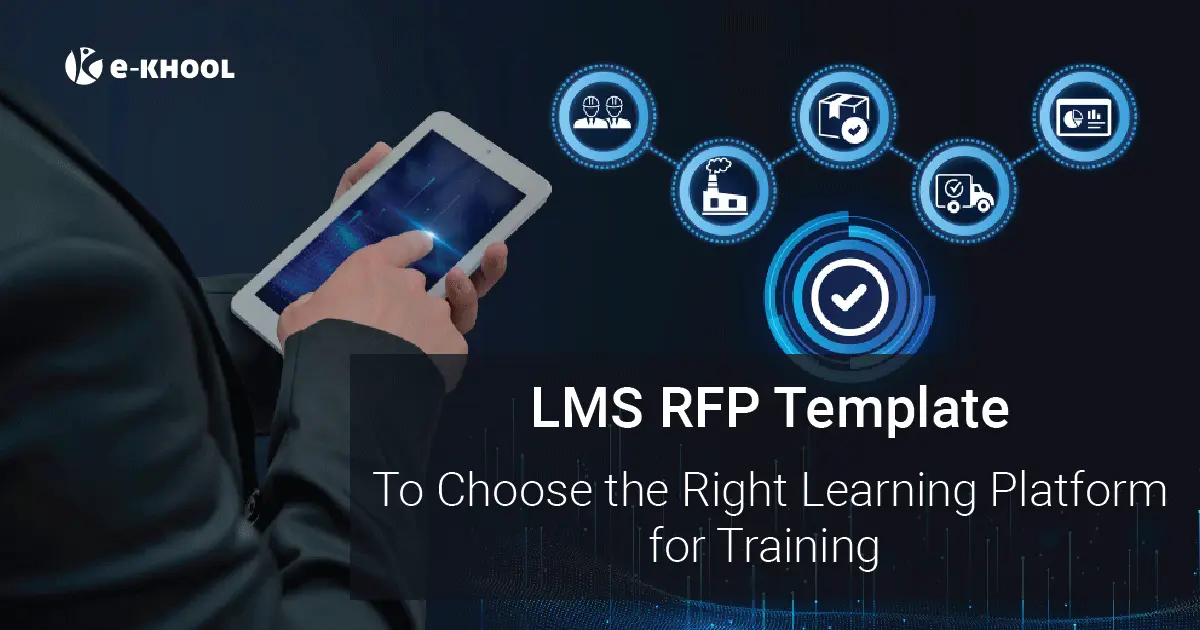LMS RFP Template
Preparing an RFP for a Learning Management System (LMS) is an essential first step in deciding which platform best suits the training requirements of your company. A well-written request for proposals (RFP) clearly defines the needs, goals, and limitations of your business and gives bidders a framework within which to present their ideas. A thorough overview of your company, the objectives for the LMS, and the necessary technical and support resources must all be included. The evaluation criteria, which include functionality, user experience, scalability, integration capabilities, and pricing, should also be specified in the RFP.
Let us just have a walkthrough of the article
Purpose of Creating LMS RFP Template
There are several reasons why a Learning Management System (LMS) RFP template should be created. It serves primarily as an organized document that companies can use to communicate to prospective LMS vendors their unique eLearning needs and expectations. A fair and uniform evaluation procedure is made possible by this formal approach, which guarantees that all vendors receive the same information. In order to evaluate the efficacy of the LMS after it has been implemented, it is essential to precisely define the demands and objectives of an eLearning project using an Learning Platform RFP template. Additionally, it helps prioritize features according to budget and necessity, making sure that businesses only pay for the services that are actually necessary and not extraneous features.
Organizations can set clear expectations and boundaries for vendors by using an LMS RFP template to specify criteria like timelines, budgetary restrictions, user counts, and technical requirements. This procedure reduces the possibility of misunderstandings and expedites the process of choosing an LMS, resulting in a more fruitful vendor-client relationship. Furthermore, by offering openness that facilitates fair pricing negotiations, a well-written Learning Platform RFP Template can result in affordable solutions. Last but not least, it guarantees that the selected LMS supports long-term training and educational objectives by being in line with the organization's strategic goals, both present and future.

Preparing Learning Management System RFP template
Finding the best platform for your company's eLearning ambitions starts with creating a Request for Proposal (RFP) for a Learning Management System (LMS). An efficient RFP should specify the objectives, specifications, and standards of your LMS project in detail so that possible vendors can submit offers that meet your company's requirements. A thorough project overview, the features and functionalities that are necessary, integration capabilities, user capacity, and any special technological preferences, such cloud-based or on-premise solutions, should all be included. Furthermore, providing vendors with a clear understanding of your implementation schedule, budgetary restrictions, and selection criteria will help them modify their proposals to fit your needs.
This procedure can be streamlined by using an extensive Learning Platform RFP template, which will enable you to cover all relevant topics methodically and facilitate like-for-like vendor comparisons. They contain sections on, among other things, the history of the organization, the goals of the project, the technical specifications, and the vendor qualifications. Additionally, if this is your first time creating an RFP, these templates frequently provide advice and best practices for writing one. Recall that the purpose of the RFP is to convey your vision for the LMS and how it fits into your larger training or educational plan, in addition to soliciting proposals.
1. About the LMS Project Tender details
A major component of organizational and educational development is the Learning Management System (LMS) project bids, which involve the purchase of technology to support online training and learning. A significant number of LMS tenders have been released in India in 2024, suggesting a strong desire to improve e-learning capabilities. Various government departments, statutory bodies, and commercial businesses that are looking to implement or improve their LMS platforms generally release these tenders. The scope of work is often described in the tender documents of LMS RFP Process including Template for LMS Selection. It may involve creating e-learning materials, developing an LMS, and occasionally offering a knowledge framework for skill development initiatives. Bidders must submit comprehensive proposals that satisfy the technical requirements and other terms and conditions specified by the tendering authority as part of the competitive bidding process.
The next challenge for the winning bidders is to provide solutions that are not just cutting edge in terms of technology but also easy to use and suitable for the educational setting for which they are meant. The LMS project tenders show a dedication to developing digital learning infrastructure and the increasing focus on providing high-quality, easily accessible education through technology.
2. LMS Software and Selection
For companies looking to execute a successful digital learning strategy, choosing the appropriate Learning Management System (LMS) software via the Request for Proposal (RFP) process is essential. An RFP is a formal document that lists the specifications of an organization and requests proposals from possible suppliers. A comprehensive RFP is created after a thorough understanding of the organization's learning objectives is obtained. A project overview, organizational background, particular LMS requirements, vendor qualifications, price, and budgetary considerations should all be included in this document. Conducting market research and identifying prospective vendors who fulfill the requirements of the firm is crucial. Following the distribution of the RFP, each vendor's proposal is carefully examined to make sure it complies with the specified specifications before the responses are evaluated. Before deciding on a relationship with the selected LMS provider, there may be trials, presentations, and more discussions during the selection process. In addition to assisting in the selection of the best LMS, a well-organized LMS RFP process, LMS Request for Proposal Template lays the groundwork for an effective rollout and long-term learning plan.
3. LMS Service Provider or LMS Vendor
For companies looking to build an efficient eLearning platform, choosing the appropriate Learning Management System (LMS) service provider or vendor through a Request for Proposal (RFP) is a crucial step in the process. An RFP enables Template for LMS Selection for an organization to precisely define its expectations and criteria, extending an invitation to LMS vendors to submit customized solutions that meet the particular requirements of the organization. An extensive needs assessment is the first step in the RFP process, during which the objectives, expected results, and technical specifications of the eLearning project are determined. The RFP document, which should include information on the scope of work, functionality requirements, user capacity, integration capabilities, and any other factors essential to the company's eLearning strategy, is built upon this evaluation.
The evaluation criteria, which may include vendor experience, solution features, cost, implementation schedule, and support services, should also be specified in the RFP. Organizations can compare vendor proposals in an objective manner by establishing these criteria. In order to guarantee that the chosen LMS satisfies cross-functional requirements and advances the organization's overarching goals, it is imperative to involve stakeholders from multiple departments in the RFP process.
4. Research and Analyze the market before LMS RFP Submission
Organizations can obtain an LMS that improves learning experiences, encourages learner engagement, and helps them reach strategic objectives with the help of a well-written RFP. Resources like Paradiso Solutions and iSpring provide thorough instructions and templates to make the process of creating an Learning Management System RFP Template easier. By conducting a thorough market study, you can select providers that best fit your requirements from a larger pool of candidates. This guarantees that the bids you receive are more closely aligned with your company goals and saves you time. Working with an LMS consultant or doing your own research via peer talks, website reviews, and technology vendor conversations can yield insightful information about which LMS solutions might be the most appropriate for your company.
Moreover, an RFP is a strategy document that outlines the primary evaluation criteria for choosing a new LMS; it is not just a formality. It should include information on the history of your company, its place in the industry, special difficulties you have faced, the kinds of customers you serve, and the things that make you stand out. Giving vendors this background information helps them better customize their offers to your unique requirements.
It is important to approach the process of writing an RFP using the Learning Platform RFP Template with the knowledge that it is the result of preliminary research. In order to better determine which suppliers would be a good fit for your project in terms of functionality, expertise, cost, and project approach, it is suggested to put out a Request for Information (RFI) prior to the Request for Proposal (RFP). Making the process more focused and controllable, the RFI can assist in identifying which three or four companies should receive your request for proposals.
Before submitting an LMS RFP, it is essential to conduct a thorough market analysis. This will guarantee that you have all the information you need to create a proposal that accurately reflects your needs and draws in offers from vendors who can meet your organization's learning and development goals. Recall that the objective is to select an LMS that can accommodate future opportunities and problems in the rapidly changing eLearning market, in addition to meeting your present demands.
Also Read:Government LMS: Boosting Efficiency of Public Sector Training & Federal Organizations
Learning Platform RFP Template Benefits

An organized Request for Proposal (RFP) is an essential document that fulfills several vital purposes for a learning platform. It serves as an official invitation to vendors, indicating to them that your company is serious about investing in and putting into use a learning management system (LMS). In order to guarantee that all prospective bidders receive the same information and are assessed according to the same standards, the RFP specifies precise needs and expectations. This procedure aids in determining the best learning management system (LMS) to match your company's learning objectives and business goals.
The opportunity to precisely specify your organization's demands and learning objectives—a crucial step in locating a solution that matches your particular context—is one of the advantages of utilizing an RFP template for a learning platform. It also makes it possible to make these demands clear to possible suppliers, guaranteeing that they comprehend your needs and are able to provide solutions that are customized for your circumstances. An RFP template also facilitates the comparison of several learning platforms at once, which speeds up the decision-making process.
Organizations can streamline their procurement process and save time and money by utilizing a common RFP Corporate Learning Software template. It makes sure that all required questions and parts are covered, which could be missed otherwise. This diligence raises the possibility of selecting the ideal LMS supplier because it motivates suppliers to submit comprehensive bids that include every facet of the company's requirements.
Furthermore, by differentiating between "must-haves" and "nice-to-haves," an RFP template can assist in prioritizing the LMS's features and functions. Making decisions based on the organization's strategic priorities and financial restrictions is made easier with this clarity. Additionally, it clarifies expectations for providers, lowering the possibility of miscommunication and guaranteeing a more seamless implementation process.
Read more: Investment in an LMS and Maximize Your ROI
Frequently asked questions on RFP template
1: What is an RFP Template?
An RFP (Request for Proposal) template is a pre-formatted document that organizations use to solicit proposals from potential vendors or service providers. It outlines the requirements, scope, and criteria for a project, allowing for a standardized process of gathering and comparing bids.
2: Why Use an RFP Template?
Utilizing an RFP template ensures that all vendors receive the same information and are evaluated on a level playing field. It also helps streamline the proposal process, saving time and resources for both the requesting organization and the vendors.
3: What is the purpose of an RFP?
A Request for Proposal (RFP) is a document issued by a business or organization to solicit proposals from potential vendors. It's a formal way of setting out the criteria for a required service or solution and inviting suppliers to submit a proposal that meets those criteria.
4: What are the key Components of an RFP?
An effective RFP typically includes a background of the company, the scope of work, requirements for the project, timelines, budget, vendor qualifications, and criteria for evaluation.
Conclusion
In conclusion, a meticulously prepared LMS RFP is a foundational document that can significantly impact the success of your eLearning initiatives. It serves not only as a request for information but also as a strategic tool that aligns your organization's learning and development goals with the capabilities of potential LMS providers. By taking the time to develop a comprehensive RFP, you position your organization to select an LMS that will enhance the learning experience for your users and support your training objectives effectively and efficiently.

